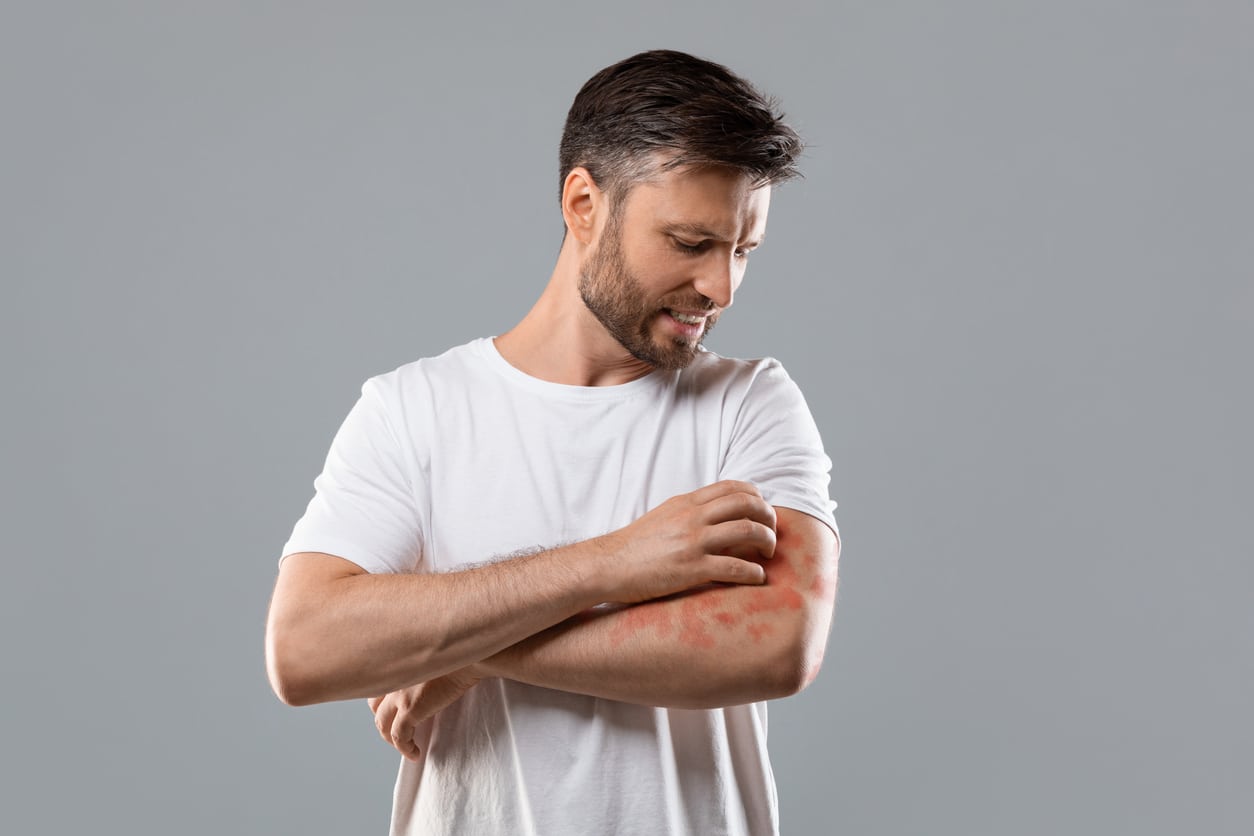Psoriasis is a common skin disease that causes the formation of scales and red patches on the skin. These can be itchy and painful. Psoriasis is a chronic disease that doesn’t have a cure, but at Bucay Center for Dermatology and Aesthetics our experienced team can help you manage your symptoms.
What is psoriasis?
Psoriasis is a chronic autoimmune condition that causes the rapid buildup of skin cells. It simply speeds up the lifecycle of the skin cells. This buildup of skin cells forms scales and red patches that can be itchy and painful. Typical psoriatic scales are whitish-silver and develop in thick, red patches. Sometimes these patches will crack and bleed.

In the normal development of skin cells, the typical cycle takes about one month. New skin cells grow deep in the dermis layer of the skin and slowly rise to the surface to eventually be shed. In people with psoriasis, this production process may occur in just a few days. This doesn’t give the skin cells time to slough off, leading to a buildup and the formation of scaly patches.
What causes psoriasis?
Why some people develop psoriasis is still somewhat of a mystery. It’s thought to be an immune system problem, especially relating to your T cells and white blood cells called neutrophils. T cells usually course through the body looking for viruses and bacteria to attack, but with psoriasis, the T cells attack healthy skin cells by mistake. This causes inflammation.
These overactive T cells also trigger increased production of healthy skin cells, more T cells, and other white blood cells, particularly neutrophils. These cells also travel into the skin causing inflammation and sometimes creating pustular lesions. Psoriasis-affected areas become warm and red, due to dilated blood vessels.
The inflammation triggers more skin cells to be produced and they move to the outermost layer of the skin too quickly — a process that should take weeks occurs in only days. These cells build up on the skin surface in thick, scaly patches.
Are there different forms of psoriasis?
Psoriasis is a common skin condition, and it can show itself in different forms.
- Plaque psoriasis — This is the most common form of psoriasis, where dry, raised, red skin lesions (plaques) covered with silvery scales form. Areas may be small or large, and they can occur anywhere on the body, even inside the mouth or on the genitals.
- Nail psoriasis — Psoriasis can affect the fingernails and toenails, causing abnormal nail growth and discoloration, pitting, and even causing the nail to loosen from the nail bed or crumble.
- Guttate psoriasis — This type of psoriasis is usually triggered by a bacterial infection such as strep throat, most often affecting children and teens. Small water-drop-shaped, scaly lesions form on the trunk, arms, legs, and scalp. These lesions aren’t as thick as most other plaques. This type may occur just a single time, or it may have repeated episodes.
- Inverse psoriasis — It’s thought that fungal infections trigger this type of psoriasis. It mainly affects the skin in the armpits, groin, under the breasts, and around the genitals. Smooth patches of red, inflamed skin form, without the isolated plaques of other types. These patches worsen with friction and perspiration.
- Pustular psoriasis — This is a rare form that affects the hands, feet, or fingertips. Pus-filled blisters develop quickly, appearing just hours after the skin first becomes red and tender.
- Erthrodermic psoriasis — This is the least common form of psoriasis. The entire body is covered with a red, peeling rash that can itch and burn intensely.
Is psoriasis painful?
Most types of psoriasis go through cycles, flaring for a few weeks or months, then subsiding for a period or even going into remission. Pain is usually not considered acute but comes more from irritation. Itching, burning sensations are common. In some forms, your joints can become stiff and swollen.
Generally, if your psoriasis becomes painful, we need to see you at Dr. Vivian Bucay’s office.
How is psoriasis treated?
As mentioned above, psoriasis is a chronic skin disease without a cure. Dr. Bucay’s goal for our psoriasis patients is to help them manage their symptoms and try to show them possible triggers for flare-ups. Our philosophy is to approach psoriasis treatment with the mildest treatments and progress to stronger options as needed. The goal is to find the most effective way to slow the cell turnover.
Topical treatments
For patients with mild to moderate psoriasis, the use of creams and ointments may be all that is necessary. Here are some of the options we use:
- Topical corticosteroids — These drugs are the first choice for treating psoriasis. They reduce inflammation and relieve itching, and they can be combined with other treatments. Long-term use can cause the skin to thin, however, so it’s best to use this as short-term treatment during flare-ups.

- Vitamin D analogues— These synthetic forms of vitamin D slow the growth of the patient’s skin cells.
- Anthralin— This drug helps slow skin cell growth, and it can remove scales and make the skin smoother.
- Topical retinoids — These vitamin A-based medications decrease inflammation, but they can also irritate the skin and make the skin light sensitive.
- Calcineurin inhibitors — These reduce inflammation and plaque build-up but are not good for long-term use.
- Salicylic acid — Commonly used in chemical peels, salicylic acid promotes sloughing of dead skin cells and reduces scaling.
- Coal tar — Coal tar reduces scaling, itching, and inflammation, but it is messy, stains clothing and bedding, and has a strong odor.
Oral and injected medications
The use of prescription oral or injected medications is known as systemic treatment. These drugs have side effects, so they are used only for brief periods, usually alternating with other forms of treatment.
- Retinoids — This vitamin A-based drug can be used with severe psoriasis, but it has side effects such as hair loss
- Methotrexate — This drug decreases production of skin cells and suppresses inflammation. It can slow the progression of psoriatic arthritis in some people.
- Cyclosporine — Cyclosporine suppresses the immune system, but it has serious side effects and can only be taken short-term.
- Injected immune system drugs — A variety of drugs are approved for the treatment of moderate to severe psoriasis that isn’t responding to other treatments.
Diet
Although there isn’t any research showing across the board effectiveness, for some patients changes in diet or taking certain supplements may help. Aloe vera and barberry can be used topically, while fish oil is taken orally.
Patient Testimonial
"I love coming to Dr. Bucay’s office. Staff is very friendly & professional. Staff makes you feel very much at ease. Feels like you are going to see family & get got up. I have been coming to Dr. Bucay’s office for 21 years. She is the best. Also, Dr. Bendari from their Stone Oak office is absolutely wonderful. Love them all!"
Will psoriasis affect my daily life? Do I have to treat it?
psoriasis is a chronic skin disease, and there is no cure. The symptoms come and go in cycles. It can flare up for a few weeks or even months, but it can then calm down or go away for a period. It can even go into complete remission. The goal is to stop the skin cells from growing so quickly. Managing the symptoms becomes paramount to living with psoriasis.

How psoriasis impacts your daily life can depend, in part, on the type of psoriasis you’re dealing with. For instance, nail psoriasis won’t have the same impact on life as a plaque psoriasis outbreak on exposed skin or the genitals.
Psoriasis isn’t a life-threatening condition, and it doesn’t require treatment. But going it alone is only asking for more frequent flare-ups and skin issues. Dr. Bucay and Dr. Bhandari are highly experienced dermatologists who make it their mission to help our patients deal with the ongoing irritation and imposition posed by psoriasis. Let us help you.
Schedule a Consultation
If you are interested in learning more about Psoriasis treatment or have general questions, contact us today to schedule a consultation!
